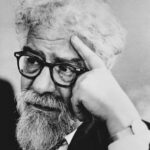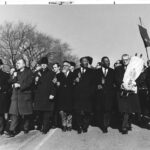Rabbi Michael Graetz
He shot an arrow into thinking about religion; it wasn’t just about don’t do this, do that, but instead make yourself open to the amazement of the world.
First Executive Director, Masorti Movement
Omer, Israel
A Jewish Perspective
I first encountered Herschel as a teenager in the Lincoln, Nebraska. Our rabbi, Harold Stern, had been Heschel’s secretary at JTS. He went on to lead a large congregation in Skokie, Illinois and became an important figure in the rabbinical assembly. Stern was a fascinating rabbi—he had been in intelligence in the US Army during World War II and spoke sixteen languages. We loved him; we were happy to go the cheder in those days because of him. He organized a group of post-bar mitzvah students who were interested in studying more deeply. We started off by studying The Sabbath. The course ended up going through much of modern Jewish thought, but Heschel was the starting point.
Stern continued my education—he gave me God in Search of Man, which grabbed me right away and I became enamored of the concept of a Jewish philosophy. Prior to that I had only thought of Judaism in terms of ritual and practice.
Eventually I got to meet Heschel in person. I attended the Jewish Theological Seminary in part to study with Heschel. He was just one of the many luminaries that drew me to the JTS for the dual degree with Columbia. It was enthralling to learn from the people who I first met through their books. My first meeting with was at a Shabbat dinner he hosted when I was an undergraduate. Later, he was in my interview for rabbinical school. It was truly intimidating. He pulled me aside after it was over and invited me to his house to discuss what I had learned in the interview.
In rabbinical school, I began working with Torah Min Hashamayim. I started reading through the volumes and I was hooked. I had never seen encountered anything so clearly laid out and insightful, delving into rabbinic thought and its cores values, while exploring the inherent contradictions in the texts. Heschel saw the genius and vibrancy in these contradictory concepts. For me this was a huge opening of the mind. Right before Heschel died, I was working with him on a translation of this book.
The main pillar that influenced me—one that I have worked on and stressed throughout my life—was that of amazement. It is essential to cultivate this sense of wonderment in your soul, in your psyche. Heschel rooted this sense of wonder in Jewish tradition and I have carried this with me. I see the wonder in everything—in the restaurants I go to, in the desert and its flowers. He shot an arrow into thinking about religion; it wasn’t just about don’t do this, do that, but instead make yourself open to the amazement of the world. Of nature. Of humanity. Of variances.


